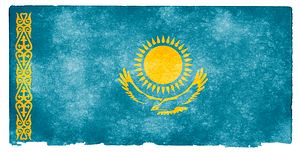On Monday, Kazakhstan’s Energy Ministry announced that it had signed an agreement with the Karachaganak Petroleum Operating (KPO) consortium to end a long-running dispute between Kazakhstan and some of it major oil partners.
The deal will see Kazakhstan paid $1.1 billion by the consortium led by Royal Dutch Shell, a British-Dutch company, and Italy’s Eni. In addition, the consortium will amend the production-sharing agreement so Kazakhstan receives a higher share of future revenue from the Karachaganak gas condensate field.
Additional terms include a $1 billion long-term loan to Kazakhstan for infrastructure development (or, barring that a $200 million payment) and an investment of $5 billion in the field to extend its profitability.
With the basic outline of a deal agreed upon, Kazakh authorities say the plan is to have a final settlement by year’s end. Kazakh Minister of Energy Kanat Bozumbayev said, “These were very difficult negotiations with the Consortium, which lasted about three years.”
The Kazakh authorities estimate that the amended production-sharing agreement will bank Astana an estimated $415 million through 2037, based on an oil price of $80 per barrel.
Karachaganak is one of the world’s largest gas condensate fields. According to bne Intellinews, Karachaganak accounts for 49 percent of Kazakhstan’s total gas output and 18 percent of the country’s oil output. The field has been a point of tension at times between Kazakhstan and its energy corporation partners.
At present, the KPO consortium is led by Shell and Eni, each with 29.25 percent stakes in the company, along with American energy giant Chevron (18 percent) and Russia’s Lukoil (13.5 percent). Kazakhstan’s state-run KazMunaiGas company holds the remaining 10 percent stake.
KPO signed a 40-year production-sharing agreement in 1997 to develop Karachaganak. That agreement — signed in the wild oil rush that characterized Kazakhstan’s early years of independence — stretches to 2038.
In late 2011, after two years of legal wrangling, Kazakhstan acquired a 10 percent stake in the Karachaganak consortium, which had previously been entirely foreign-owned. In 2009, Astana began filing tax claims against KPO and in returned KPO filed an arbitration case against Kazakhstan.
KazMunaiGas joining the consortium settled those legal battles, but in the ensuing years Kazakhstan argued that it deserved more from the project. In 2016, Reuters reported that Lukoil said in a company financial report that Kazakhstan had filed a $1.6 billion claim against the consortium’s foreign partners.
“The dispute relates to a formula which determines how profit from the development is split between the companies and the government…noting the parties were in talks on a possible settlement,” Reuters reported at the time.
In May 2018, Reuters reported Kazakh Energy Minister Bozumbayev as saying that Kazakhstan anticipated ending the dispute within a month. More than four months later, the details of the potential deal are finally out on the table. Making the details public marks significant progress. Kazakh authorities anticipate finalizing the agreement by the end of 2018.

































